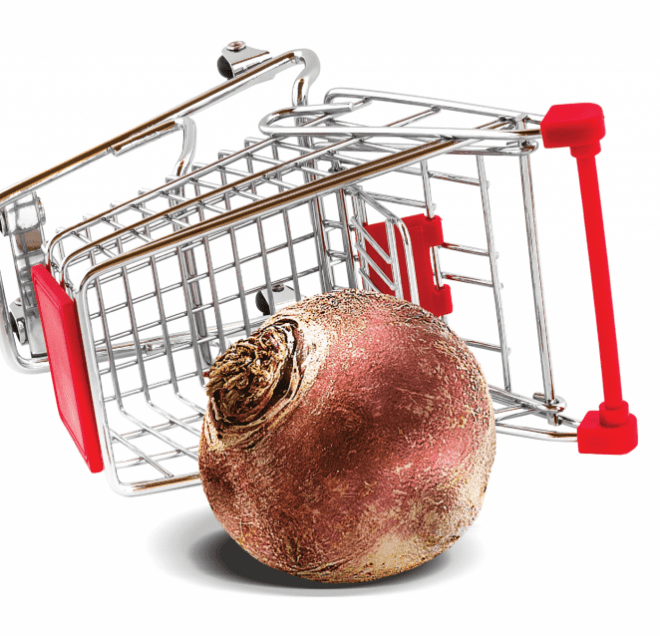
Supermarkets in the Netherlands are avoiding responsibility for one third of their CO2 & methane emissions
Our new report explores whether Dutch supermarkets are doing enough to tackle the climate impact of their meat and dairy.
Today, Feedback EU published its first report (in Dutch or read the English summary here): a brief exploring the role of Dutch supermarkets in addressing the country’s climate footprint by taking responsibility for the environmental impact of their high meat and dairy sales. Frank Mechielsen, Campaign Lead in the Netherlands, explores how they’re measuring up.
During the Climate Summit COP26 this week in Glasgow, it is important that Dutch supermarkets show their ambitions in their fight against climate change. In their announcements, they emphasize the reduction of CO2 emissions in their own stores and their transport, but what they don’t mention is that this is only a small part of their overall emissions. Like in the UK, 95% of supermarket emissions come from the supply chain. About a third of this is caused by the production of meat and dairy. Two major retailers, Albert Heijn and Lidl, are starting to become transparent about their meat sales, but no supermarket has a plan to reduce meat and dairy sales.
The report draws on a poll by IPSOS among a representative sample of 994 Dutch citizens. Four in ten young people see a greater role for supermarkets in reducing meat consumption. For example, by fewer promotions on meat and more promotion of meat substitutes. Supporters of the Green party (GroenLinks), the Party of the Animals, and Democrates D66 also expect more leadership from supermarkets on this theme. Furthermore, 18% of young people up to the age of 35 say they do not buy meat, almost twice as high as average.
With an 80% market share, the five largest retailers have an enormous influence on the food system in the Netherlands. Last year, supermarkets saw their turnover increase by 14% thanks to the impact of Covid-19. Nearly half (45%) of consumers under 35 believe that supermarkets should reinvest their Covid-19 profits in offering more plant-based and sustainably produced products.
Dutch supermarkets continue to offer too much cheap meat, which causes more than half of the food-related greenhouse gas emissions worldwide. In the Netherlands, livestock is the driving force behind the nitrogen crisis, and growing emissions of methane, a highly potent greenhouse gas. Supermarkets must take more responsibility for the climate impact throughout their entire chain by halving the sale of meat and dairy by 2030, and offer more healthier and plant-based food. If they don’t, they won’t be able to achieve their climate ambitions.
The report analysed data and commitments from the five major retailers and concludes that Albert Heijn, through parent company AholdDelhaize, is the only retailer to be transparent about greenhouse gas emissions across their entire supply chain, including the part caused by animal proteins.
Supermarkets are starting to respond to this growing climate priority. Albert Heijn is committed to achieving a 50/50 balance in animal/vegetable proteins by 2025 and showed for the first time its current ratio in protein sales: 70% animal to 30% vegetable. Furthermore Lidl announced that 25% of their total revenue derives from fresh meat and dairy products. Jumbo set a new target to increase their plant-based alternatives from the current 4% to 10% by 2025. But no major supermarket has so far set specific targets to reduce meat and dairy sales. The much smaller Ekoplaza is at the forefront of this and has specific targets to reduce meat sales by 2022.
Feedback’s UK scorecard, published in June 2021, showed that none of the UK’s 10 largest supermarkets are taking steps to reduce meat supply. They continue to encourage meat consumption through low-price promotions, labelling and product placement. In 2022, Feedback will launch a scorecard together with partners from other EU countries to assess supermarkets on their commitments, policies and trade practices to tackle climate change and the transition to less and better meat.
The recent Food Policy Coalition report, to which Feedback contributed, emphasises the importance of a healthy and sustainable food environment. Supermarkets must use their marketing resources to enable their customers to make healthy and sustainable choices, which means eating far less meat and dairy and where they do choose to eat meat buying ‘better’. Instead of the current fixation on price, supermarkets should place other values such as human and animal health, environment, climate, fair income for farmers and workers much more centrally in their communication to their customers.
The Food Transition Coalition (TCV), in which Feedback EU participates, advocates an ambitious ‘protein transition’ from 60/40 to 40/60 in animal/vegetable proteins to be achieved by 2030. During the ‘Plant the Future’ dinner last month, more than 100 organisations and companies came together to discuss how plant-based can become the new normal. Politicians must make the protein transition a spearhead in policy aimed at food, climate and health. Businesses must be directed to adjust the supply and promotion of animal products. The True Animal Protein Price Coalition (TAPPC), active this week at the CoP in Glasgow, promotes an environmental tax on meat. According to the PBL, this leads to a reduction of 2 Mton CO2 eq. per year, a small coal-fired power station. A large majority of the population in the Netherlands supports an environmental tax on meat in the coalition agreement, which D66 and Christen Unie also support.
A third of AholdDelhaize’s total emissions are produced by meat and dairy. This corresponds to the annual emissions from heating 6 million homes, three quarters of all homes in the Netherlands. Supermarkets must increase their climate ambitions and sell less meat and more vegetables, fruit, legumes, nuts and grains. It is especially important during this COP26 Climate Summit in Glasgow that companies set a good example.